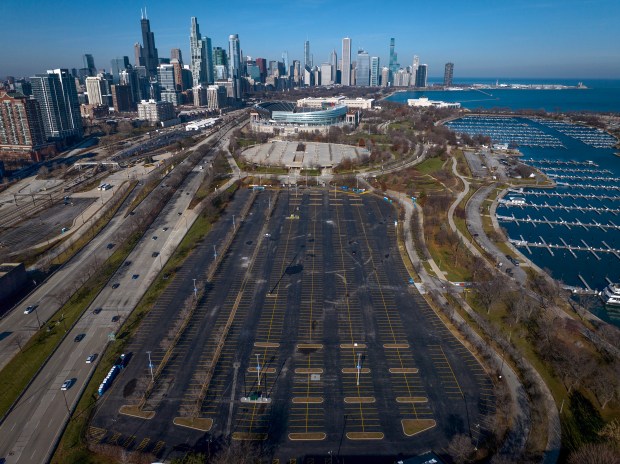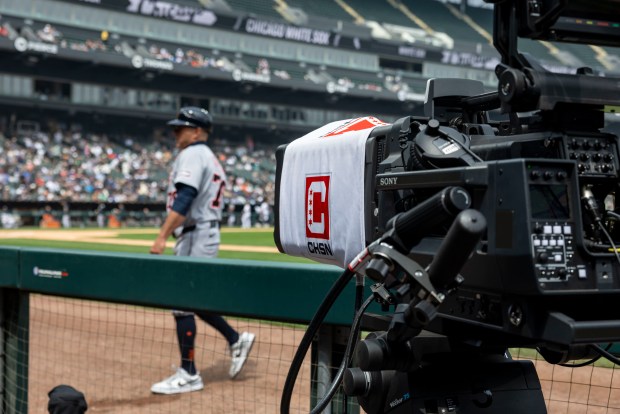Even as the possibility emerges for the Chicago Bears to build a new stadium in the city, the team has resumed negotiations with suburban school districts over the property taxes for their proposed stadium site in Arlington Heights.
Arlington Heights Mayor Tom Hayes said he remains optimistic for an agreement, and poured cold water on news that the Bears and White Sox are in conversations about combining public financing for new stadiums for each in Chicago.
“I have to laugh at these reports,” he said. “I don’t think it’ll ever come to fruition. It makes absolutely no sense.”
Recently, the Bears have been looking into an enclosed stadium along the lakefront on parking lots just south of their current home at Soldier Field, said a source familiar with the project. They’re working with Mayor Brandon Johnson’s office, the law firm of Sidley Austin and investment bank Goldman Sachs on a potential public-private partnership. The source said specific details about such a project for the Bears could be released soon.
As proposed, the Bears and White Sox would seek taxpayer-backed financing through the Illinois Sports Finance Authority (ISFA), just as they have now. But the 2% Chicago hotel tax meant to pay for the teams’ current stadiums wasn’t enough last year to cover the debt, so any deal presumably would need additional revenue to cover any additional cost.
While Hayes has seen a proposal to put both stadiums on the 78, the vacant South Loop site proposed for a new Sox park, the mayor said it wouldn’t accomplish the Bears’ stated goals to own a stadium and have room for a surrounding entertainment district.
The team paid $197 million to buy the former Arlington Park site more than a year ago, and proposed a $5 billion development to include a stadium, housing and entertainment. But the Bears were unable to reach agreement with three local school districts over property taxes for the site, which sits vacant since the team demolished the former racetrack grandstand.
Arlington Heights officials have been continuing to encourage an agreement with Arlington Heights-based Township High School District 214, Palatine-based Township High School District 211, and Palatine Community Consolidated School District 15, which collect most of the property taxes from the former Arlington Park.
“We’re talking to them,” Hayes said of the team and the schools. “We’re trying to emphasize that they’re very, very close. I’m still hopeful that we’re going to come to an agreement.”
While the Cook County assessor reassessed the property to $192 million, close to the sales price, the Cook County Board of Review lowered that to $125 million. The result would still raise the Bears’ potential property tax to more than $10 million, which the team says prevents its development.
The Bears are likely to challenge the tax ruling in Cook County court or to the Illinois Property Tax Appeal Board, but either option could take years to resolve. The team doesn’t pay property taxes on its current home at Soldier Field because the Chicago Park District owns the site.
Any proposal to build a stadium on the lakefront would run into opposition from the Friends of the Parks, which previously filed suit to stop a proposed Star Wars museum in the same area.
At an unrelated event Thursday in Decatur, where the Bears were founded more than a century ago as the Decatur Staleys, Gov. J.B. Pritzker was asked whether he’s spoken to the Bears or White Sox since expressing his reluctance last week to provide major state funding for sports stadiums.
“No new developments,” he said. “Nothing new.”
The Bears reissued a statement that the team “will continue to work with local municipalities to select the best location for the future stadium of the Chicago Bears that will bring a transformative opportunity to our region — boosting the economy, creating jobs, and generating millions in tax revenue.”
The NFL, which approved a $200 million loan for a new Buffalo Bills stadium, is expected to provide a multi-million dollar loan for the Bears project, wherever it ends up.
Check back for updates.
Chicago Tribune’s Jeremy Gorner contributed.
rmccoppin@chicagotribune.com




